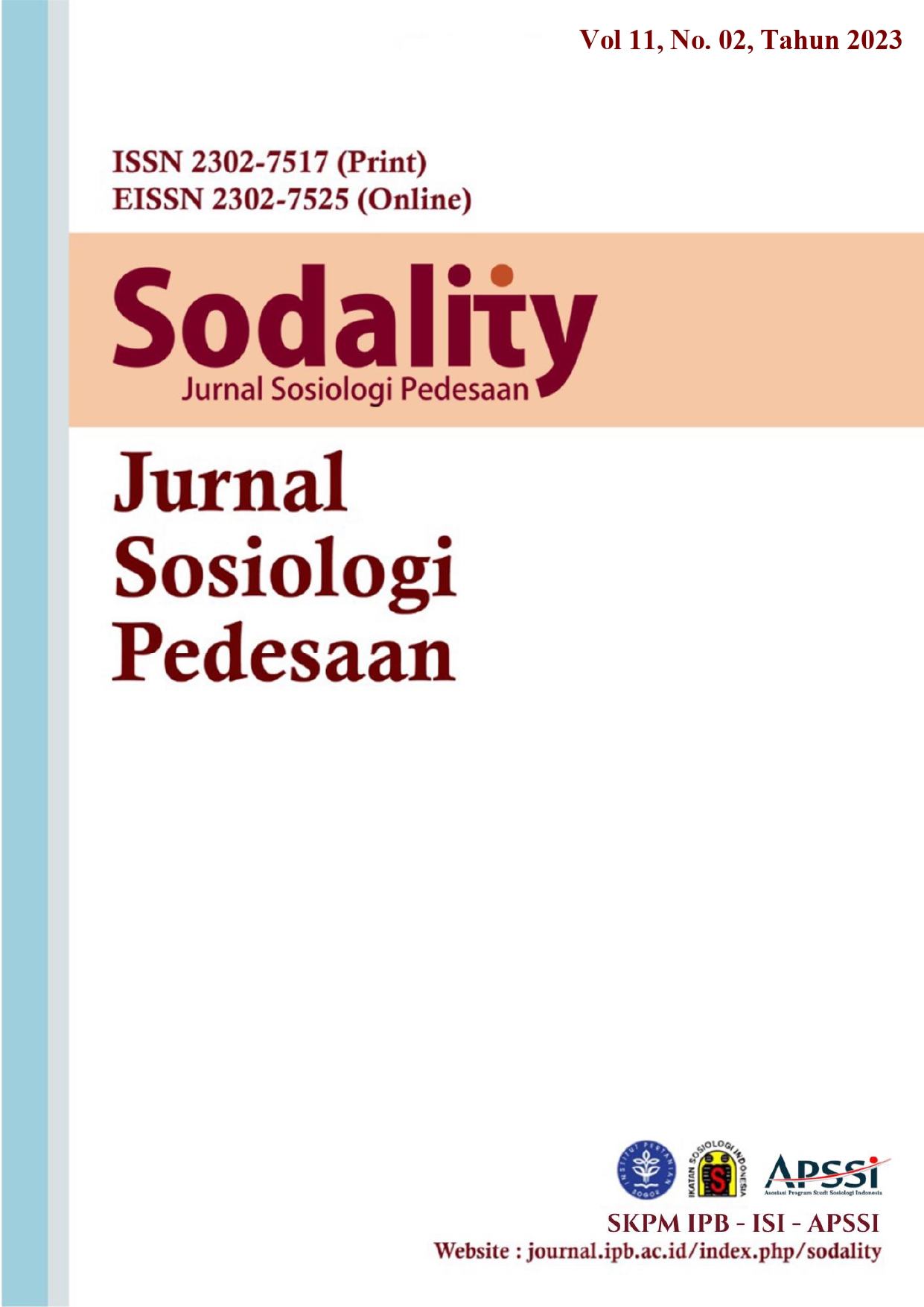SPR: Empowerment of Smallholder Livestock Farmer Community
Abstract
The School for Smallholder Livestock Farming (SPR) as a participatory learning program for smallholder livestock farmers in Indonesia has three main objectives, namely (1) changing the mindset and character of livestock farmers from individual-traditional farmers to professional mutually cooperative collective livestock entrepreneurs, (2) building mutual cooperation collective businesses in livestock and other commodities, and (3) strengthening science and technology as a basis for farmers to cultivate livestock business-oriented. This research aims to investigate the changes that occur in the community of smallholder farmers after participating in the SPR-IPB program and measure the level of effectiveness of the SPR program. The research used mixed methods with quantitative and qualitative approaches. Data collection was carried out in three locations in the community of smallholder farmers. Respondents are farmers who have graduated from the SPR program and have joined the Indonesian SPR Alumni Solidarity Association (SASPRI). The research time is one full month, in December 2022. The results of this research show that the SPR program can achieve its three goals and change the actions of farmers at the community level.
References
Adi. (2013). Intervensi Komunitas dan Pengembangan Masyarakat. Rajawali Pers.
Agatha, MA, Sjaf, S., & Muladno. (2022a). Dimensi etnisitas dalam pemberdayaan komunitas peternak [Thesis,IPB University]. https://repository.ipb.ac.id/handle/123456789/113998
Agatha, MA, Sjaf, S., & Muladno, M. (2022b). Tingkat Efektivitas Pemberdayaan di Komunitas Peternak. Jurnal Neo Societal, 7(3), 94–100. https://doi.org/10.52423/JNS.V7I3.25614
Agatha, M. A., Sjaf, S., & Muladno, M. (2023). The Influence of Local Actors in the Empowerment of Smallholder Livestock Farming Communities Pengaruh Aktor Lokal dalam Pemberdayaan Komunitas Peternak Rakyat. 10(03), 251–263. https://doi.org/https://doi.org/10.22500/10202241289
Ahmad, M. S., & Talib, N. A. (2014). Analysis of Community Empowerment on Projects Sustainability: Moderating Role of Sense of Community. Social Indicators Research, 129(3), 1–18. https://doi.org/https://doi.org/10.1007/s11205-014- 0781-9
Ansar Firman, A., Jenderal Perimbangan Keuangan, D., & Keuangan, K. R. (2021). Pemberdayaan Masyarakat di Desa Berbasis Komunitas: Review Literatur. Jurnal Ilmiah Tata Sejuta STIA Mataram, 7(1), 132–146. https://doi.org/10.32666/TATASEJUTA.V7I1.196
Anshari, M. (2019). Motivasi Bergabung dengan Sekolah Peternakan Rakyat Tunas Barokah Bojonegoro. Institut Peratanian Bogor.
Bahruddin, A. (2018). Analisis Pendapatan Usahaternak Sapi Sekolah Peternakan Rakyat Mega Jaya. Institut Pertanian Bogor.
Bastaman, K., Nawawi, A., & Taharudin, T. (2020). Efektivitas Program Desa Migran Produktif (DESMIGRATIF) Pada Dinas Tenaga Kerja dan Transmigrasi Kabupaten Subang. The World of Public Administration Journal, 2(2), 169–191. https://doi.org/10.37950/wpaj.v2i2.928
BPS Jatim. (2018). Badan Pusat Statistik Provinsi Jawa Timur 2009-2017. https://jatim.bps.go.id/statictable/2018/10/18/1300/populasi-sapi-potong-menurut-kabupaten-kota-di-jawa-timur-2009-2017-ekor-.html
Dewi, Y. N., Melati, E., Munawwaroh, K., Silfia, E., & Sadjiran. (2023). Program Pemberdayaan Perempuan Berbasis Kearifan Lokal untuk Meningkatkan Kesejahteraan Masyarakat di Wilayah Pesisir Indonesia. Reswara : Jurnal Pengabdian Kepada Masyarakat, 4(1), 784–792. https://doi.org/DOI: https:doi.org/10.46576/rjpkm.v4i1.2658
Hardianto. (2022). Determinasi Pemberdayaan Masyarakat dan Pemberantasan Kemiskinan Desa: Analisis Dana Desa dan Alokasi Dana Desa. Jurnal Ilmu Pendidikan Dan Ilmu Sosial, 3(1), 266–275. https://doi.org/10.38035/JMPIS.V3I1.872
Hasim, & Rewiswal. (2019). Community Development Berbasis Ekosistem : Sebuah Alternatif Pembangunan Masyarakat. Diadit Media.
Kambey, E. (2017). Efektivitas Penggunaan Dana Desa dalam Pelaksanaan Pembangunan di Desa Karegesan Kecamatan Kautidan Kabupaten Minahasa Utara. Jurnal Eksekutif. https://ejournal.unsrat.ac.id/index.php/jurnaleksekutif/article/view/16756
Mahsyar, S. S., & Nihayati, A. (2022). Peran Pemberdayaan Komunitas Sona Circle Terhadap Integrasi Finansial Kelompok Pengungsi di Inggris. Journal of Social Development Studies, 3(2), 116–127. https://doi.org/10.22146/jsds.5234
Mardikanto. (2010). Konsep-konsep Pemberdayaan Masyarakat. Fakultas Pertanian, UNS.
Muladno. (2016). Realita di Luar Kandang II. PT. Permata Lestari.
Muladno, Sjaf, S., Prastowo, & Suprayogi, A. (2019a). Sekolah Peternakan Rakyat-1111 Institut Pertanian Bogor (SPR-1111). LPPM IPB University.
Muladno, Sjaf, S., Prastowo, & Suprayogi, A. (2019b). Sekolah Peternakan Rakyat (SPR-1111) IPB.
Munira, C. A. (2023). Pertisipasi Masyarakat Berbasis Kelompok Tani dalam Memberdayakan Ekonominya di Gampong Pulo Mesjid Li Kecamatan Tangse Kabupaten Pidie. UIN Ar-Raniry.
Natsir, M. (2021). Efektivitas Program Usaha Peningkatan Pendapatan Keluarga Sejahtera (UPPKS) untuk Pemberdayaan Masyarakat Miskin Muntaha Mardhatillah. JESS (Journal of Education on Social Science, 5(1), 36–50. https://doi.org/https://doi.org/10.24036/jess.v5i1
Neuman, W. L. (2013). Social Research Merhods: Qualitative and Quantitaive Approachhes 7th Edition. Pearson Education Limited.
Rangkuti. (2011). Komunikasi Pembangunan dan Mekanisasi Pertanian. IPB Press.
Saharuddin. (2009). Pemberdayaan Masyarakat Miskin Berbasis Kearifan Lokal. Sodality: Jurnal Sosiologi Pedesaan, 3(1). https://doi.org/10.22500/SODALITY.V3I1.5873
Wantona, S., Kinseng, R. A., & Sjaf, S. (2017). The Political Practice of Identity. Jurnal Sosiologi Pedesaan, 6(1), 79–87. https://doi.org/10.22500/sodality.v6i1.21211
Wilkinson, A. (1997). Empowerment: theory and practice. School of Management, UMIST, Manchester, UK.
Authors who publish with this journal agree to the following terms:
- Authors retain copyright and grant the journal right of first publication with the work simultaneously licensed under a

This work is licensed under a Creative Commons Attribution 4.0 International License. that allows others to share the work with an acknowledgement of the work's authorship and initial publication in this journal. - Authors are able to enter into separate, additional contractual arrangements for the non-exclusive distribution of the journal's published version of the work (e.g., post it to an institutional repository or publish it in a book), with an acknowledgement of its initial publication in this journal.
- Authors are permitted and encouraged to post their work online (e.g., in institutional repositories or on their website) prior to and during the submission process, as it can lead to productive exchanges, as well as earlier and greater citation of published work (See The Effect of Open Access).





.png)









